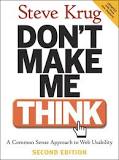In effort to teach myself more about web design I have read “Don’t make me think” by Steve Krug. I recommend the book to everyone interested in the same subject. This book seams as a good starting point and additionally it is small and is being read very fast. If you are planning to read this book maybe it is best to wait for the third edition that will be out soon. Update – third edition is out.

So here are my most important notes I am sharing so I can look them up later.
- Webpage should probably have following elements that should be easy to spot:
- Site ID/Logo and tagline – Indicates what site is this? It should be clickable and lead to home page.
- Site Sections – Indicates what are the major sections of this site? Current sections should be highlighted.
- Site Search – Especially important for users that prefer searching to browsing
- Utilities – Less important common link like login, home, how to by…
- Page name – Clearly informs user on what page are currently.
- Local (contextual) navigation - Show what are user options on current page?
- Breadcrumbs – Clearly explaining where user is in site hierarchy and offering easy way to go back to some upper level.
- Home page is different from the rest of the site and it should be designed more like billboard or cover of the magazine. For some visitors home page will be only chance to leave good impression about your site.
- Home page common elements:
- Site ID/Logo and tagline
- Site Sections – to give an overview of what site has to offer.
- Site Search
- Welcome blurb – short description of site that should be visible without scrolling.
- Teases – hints of good site good stuff (top stories, hot deals, most popular pages…)
- Timely content – like recent news/comments to signal that site is live and frequently updated.
- Start here – It should be clear to user how to begin using the site (e.g. user registration)
- Things that are related logically should be related visually
- Make it obvious what is clickable.
- Omit needles words. Design web pages for scanning, not reading.
- Good design makes web site obvious to users and it doesn’t requires them to think too much how to use it.
- Test usability of your site at least once a month.
Few months ago I found out about a book How to Win Friends & Influence People by Dale Carnegie that was recommended by Joel Spolsky:

Finally, and I know it sounds cheesy, but Dale Carnegie’s 1937 book How to Win Friends & Influence People is actually a fantastic introduction to interpersonal skills. It’s the first book I make all the management trainees at Fog Creek read, before anything else, and they always snicker when I tell them to read it, and love it when they’re done.
Well, book did sound really cheesy. Accidentally I came across this book in audio format which duration was little more than 5 hours. The book was short, simple, pragmatic and surprisingly reviling. It focuses on people relations, communications and misunderstandings. The whole book is composed of real world anecdotes so messages are clear and very easy for listening. The book main lesson on people relations (in my own interpretation) is: listen, understand and respect other. For summary of all advices see this link.
Who is this book for?
Well book title sounds like a weapon for some insincere and manipulative manager, but turns out that it contains useful lessons for everyday life and surprisingly useful in everyday work of an engineer.
Programmers and Communication
Programmers, probably like any other engineers, aren't focused so much on people relations in every day work. They are focused on technical issues that are very much enough for consuming person's whole taught in one day. Problem is that problems being solved by programmers tend to be complex and like that are better solved when more brains are involved in synergy.
Problems being solved by programmers are such that there is no “one right solution”, so informed decisions must be made by team members on daily basis and all team members should be aware of them. Usually, decision process consists of every man contributing with ideas. All ideas are valuable in some way but small amount of them will be accepted. This can lead to broken pride and programmers are known to have ego issues.
From all said above it should be clear that good engineer should also be good communicators. If we take a look at Scrum, we'll see that basically Scrum Master is playing role of communication facilitator in software development. That’s how important is communication in Scrum.
Avoiding Confrontations
One of the best advices I have received from this book is “Avoid arguments, you can only lose”. This is important because design sessions can easily go from technical to emotional arguments and no matter who is right, arguers will defend and embrace their previous positions. In the end even “winning” will hurt the loser’s pride and build resentment.
A Guide to avoiding arguments:
- Welcome the disagreement. Be thankful for a new opinion.
- Stay calm.
- Listen first. Hear your opponents out.
- Identify areas of agreement.
- Admitting errors will make it easier for others to admit theirs.
- If no resolution is found, postpone action and promise to explore the opposing perspective